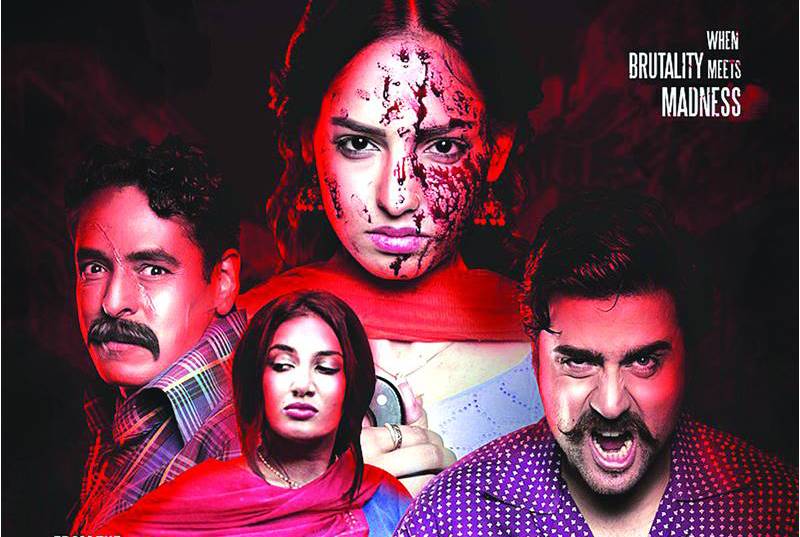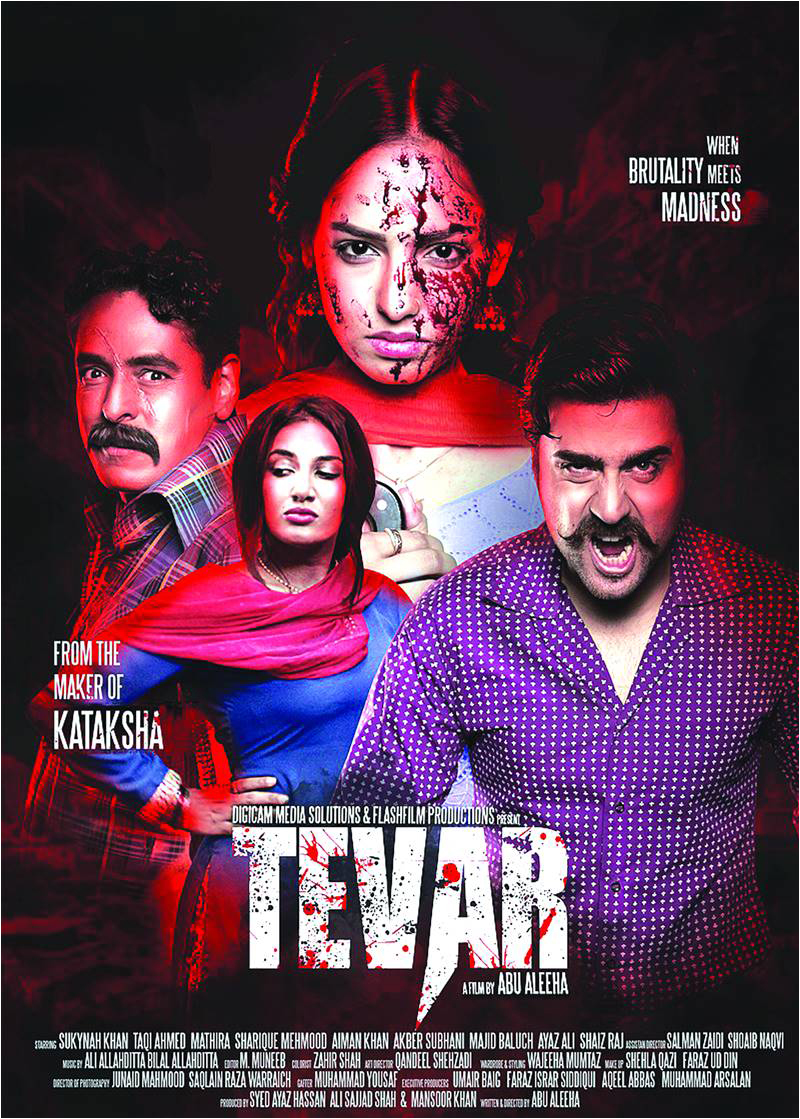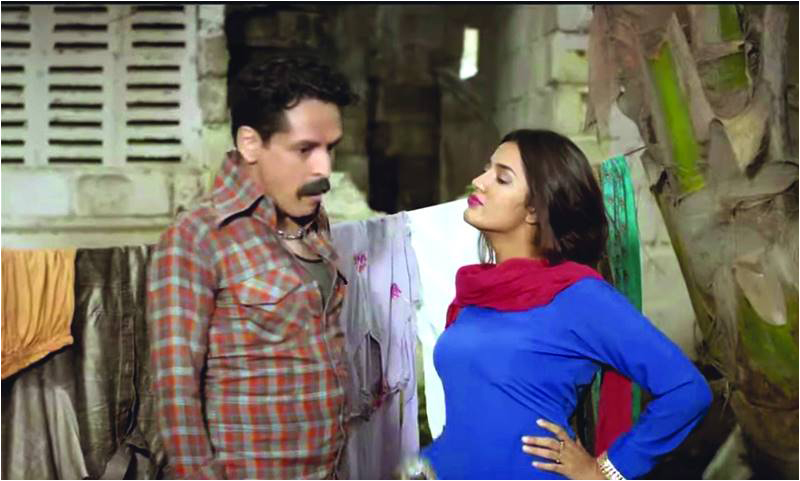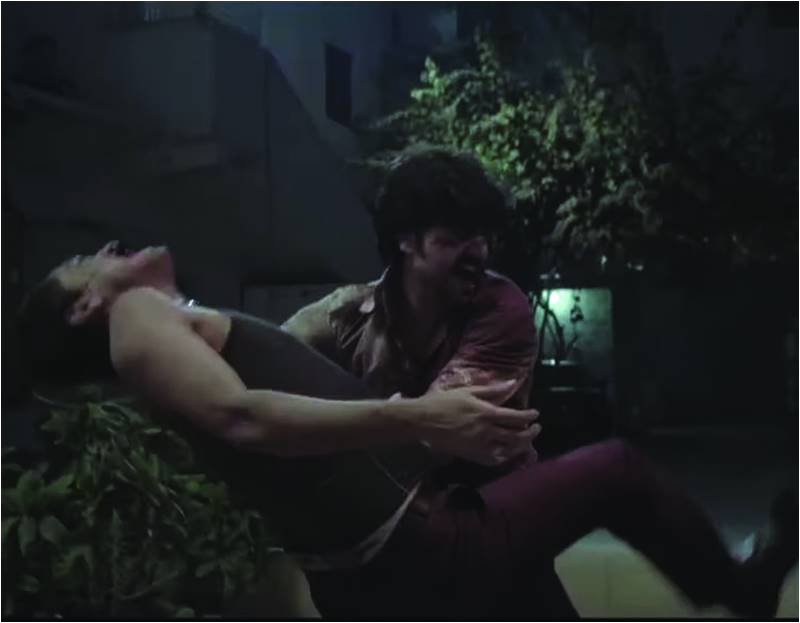
Before we entered the Lollywood royal rumble during the Eid week – the hangover of which has continued in this space over the past four weeks or so – there was another film release that snuck under the radar just as the troika of bigger banner productions hit the multiplexes last month.
Abu Aleeha’s second directorial offering Tevar came out on the 26th of July. It is hard to imagine the film still being screened anywhere in the country, but we have the responsibility of offering our opinion on the project.
This is especially true since a detailed analysis on Abu Aleeha’s debut film Kataksha was written in this space two months ago, under the headline “Psychopathic horror”.
A portion of the review, describing that film read:
“The horror one traverses while watching the film is of a completely different kind, the most thrilling experience is the walk through exit door…”
Having said that, let us reassure you that Tevar – that came out a month after Kataksha, and was actually the film that Abu Aleeha first began working on – is considerably worse.

It can be said without any inhibition – not that we exhibit any of that in this space! – and absolute confidence, that Tevar fails as a film, a piece of art, and as a combination of voluntary human movements, in every aspect, even those in which Kataksha did not.
The fact that the film is low-budget works well for anyone who spent their money on it – except, of course, those spending money on watching it. And where Kataksha’s clear positive was that with a run-time of 95 minutes it only wasted an hour and a half of your life, Tevar will steal another five minutes clocking at 100 minutes. This is time that you’ll never get back.
With the low budget and the low run-time being the two most obvious positives, Tevar’s negatives run the entire spectrum from horrendous acting, atrocious screenwriting, calamitous camerawork, catastrophically out-of-sync sound effects and an ominous dialogue-burying background score.

Tevar makes you admire Kataksha’s cinematography and even the half-boiled acting. It leaves nothing unturned, stones or otherwise, to be a benchmark for the lows that filmmaking can reach.
At certain points, it seems as though Abu Aleeha the producer, director and writer of the film just got tired of the whole thing and literally threw all the ingredients on to the silver screen, where they all collectively, haphazardly splashed. That splash, ladies and gentleman, is Tevar.
One would have thought that a film that identifies as a thriller and is set during the 1989 Orangi Operations in Karachi, would not have a particularly daunting task ahead to just put in the remaining pieces to form a watchable spectacle. For, the setting itself couldn’t have been more thrilling.

The film kills any thrill you might have had going into the multiplex, with the filmmakers clearly inept and dealing with the tools that they’ve asked for themselves.
Tevar starts with the marriage proposal of Shafqat (Taqi Ahmed) for Arifa (Sukynah Khan), which is rejected as Arifa isn’t a fan of cousin marriages.
Meanwhile, as Shafqat is getting ready to go back to Hyderabad, riots break out in Karachi – but the filmmakers choose not give any backstory of the reasons behind the development.
Moving forward, Arifa’s father (Akbar Subhani) gets beaten during the riots, while Arifa’s sister is sexually assaulted on the street. The situation for the whole family is aggravated as goons enter their home. The storyline is largely based on the family coping with the unrest in the city.
The acting leaves nothing to write home about, but performances by Sukynah Khan and Taqi Ahmed aren’t the worst thing in the film. Sharique Mehmood in the negative role is perhaps the highlight as far as the performances are concerned. Indeed, the horrific dialogue given out to the cast doesn’t make their jobs particularly easy.
Even so, no matter how dreadful everything else might be, you just won’t be able to look past the appalling camerawork throughout the film. You, the reader, might have done a better job with a DSLR in your hand. There are literally out-of-focus, blurry scenes where the director seems to be trying to capture something other than the main character on the screen.
Tevar is punishment for your eyes and your ears as well, with shocking sound-mixing, which is out of place, terribly synchronized and hastily done. In many scenes, you will see the door opening, or something crashing on to the floor – and only hear it happen after a couple of seconds.
In many scenes, the dialogues were buried by the background music. Although, given the quality of writing, that might not have been the worst thing to happen for the audience.
Abu Aleeha’s second directorial offering Tevar came out on the 26th of July. It is hard to imagine the film still being screened anywhere in the country, but we have the responsibility of offering our opinion on the project.
This is especially true since a detailed analysis on Abu Aleeha’s debut film Kataksha was written in this space two months ago, under the headline “Psychopathic horror”.
A portion of the review, describing that film read:
“The horror one traverses while watching the film is of a completely different kind, the most thrilling experience is the walk through exit door…”
Having said that, let us reassure you that Tevar – that came out a month after Kataksha, and was actually the film that Abu Aleeha first began working on – is considerably worse.

It can be said without any inhibition – not that we exhibit any of that in this space! – and absolute confidence, that Tevar fails as a film, a piece of art, and as a combination of voluntary human movements, in every aspect, even those in which Kataksha did not.
The fact that the film is low-budget works well for anyone who spent their money on it – except, of course, those spending money on watching it. And where Kataksha’s clear positive was that with a run-time of 95 minutes it only wasted an hour and a half of your life, Tevar will steal another five minutes clocking at 100 minutes. This is time that you’ll never get back.
With the low budget and the low run-time being the two most obvious positives, Tevar’s negatives run the entire spectrum from horrendous acting, atrocious screenwriting, calamitous camerawork, catastrophically out-of-sync sound effects and an ominous dialogue-burying background score.

Tevar makes you admire Kataksha’s cinematography and even the half-boiled acting. It leaves nothing unturned, stones or otherwise, to be a benchmark for the lows that filmmaking can reach.
At certain points, it seems as though Abu Aleeha the producer, director and writer of the film just got tired of the whole thing and literally threw all the ingredients on to the silver screen, where they all collectively, haphazardly splashed. That splash, ladies and gentleman, is Tevar.
One would have thought that a film that identifies as a thriller and is set during the 1989 Orangi Operations in Karachi, would not have a particularly daunting task ahead to just put in the remaining pieces to form a watchable spectacle. For, the setting itself couldn’t have been more thrilling.

The film kills any thrill you might have had going into the multiplex, with the filmmakers clearly inept and dealing with the tools that they’ve asked for themselves.
Tevar starts with the marriage proposal of Shafqat (Taqi Ahmed) for Arifa (Sukynah Khan), which is rejected as Arifa isn’t a fan of cousin marriages.
Meanwhile, as Shafqat is getting ready to go back to Hyderabad, riots break out in Karachi – but the filmmakers choose not give any backstory of the reasons behind the development.
Moving forward, Arifa’s father (Akbar Subhani) gets beaten during the riots, while Arifa’s sister is sexually assaulted on the street. The situation for the whole family is aggravated as goons enter their home. The storyline is largely based on the family coping with the unrest in the city.
The acting leaves nothing to write home about, but performances by Sukynah Khan and Taqi Ahmed aren’t the worst thing in the film. Sharique Mehmood in the negative role is perhaps the highlight as far as the performances are concerned. Indeed, the horrific dialogue given out to the cast doesn’t make their jobs particularly easy.
Even so, no matter how dreadful everything else might be, you just won’t be able to look past the appalling camerawork throughout the film. You, the reader, might have done a better job with a DSLR in your hand. There are literally out-of-focus, blurry scenes where the director seems to be trying to capture something other than the main character on the screen.
Tevar is punishment for your eyes and your ears as well, with shocking sound-mixing, which is out of place, terribly synchronized and hastily done. In many scenes, you will see the door opening, or something crashing on to the floor – and only hear it happen after a couple of seconds.
In many scenes, the dialogues were buried by the background music. Although, given the quality of writing, that might not have been the worst thing to happen for the audience.

